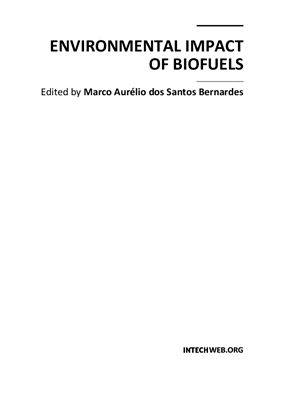Published by InTech Janeza Trdine 9, 51000 Rijeka, Croatia. 2011.
ISBN 978-953-307-479-5, Hard cover, 270 p.
Первоисточник: http://www.intechopen.com.
This book aspires to be a comprehensive summary of current biofuels issues and thereby contribute to the understanding of this important topic. Readers will find themes including biofuels development efforts, their implications for the food industry, current and future biofuels crops, the successful Brazilian ethanol program, insights of the first, second, third and fourth biofuel generations, advanced biofuel production techniques, related waste treatment, emissions and environmental impacts, water consumption, produced allergens and toxins. Additionally, the biofuel policy discussion is expected to be continuing in the foreseeable future and the reading of the biofuels features dealt with in this book, are recommended for anyone interested in understanding this diverse and developing theme.
Contents:
Environmental impacts of production of biodiesel and its use in transportation sector
The impact of oil palm expansion on environmental change: putting conservation research in context
Allergens and toxins from oleaginous plants: problems and solutions
Emissions of diesel - vegetable oils mixtures
Biofuels and ecosystem carbon balance under global change
Biofuel combustion emissions - chemical and physical smoke properties
Groundwater and health implications of biofuels production
Biobased economy – sustainable use of agricultural resources
Implications of biofuel feedstock crops for the livestock feed industry in Canada
Uncertainty analysis of the life-cycle greenhouse gas emissions and energy renewability of biofuels
Biofuel programs in east asia: developments, perspectives, and sustainability
Air quality and biofuels
Identification of work tasks causing high occupational exposure to bioaerosols at biofuel plants converting straw or wood chips
Первоисточник: http://www.intechopen.com.
This book aspires to be a comprehensive summary of current biofuels issues and thereby contribute to the understanding of this important topic. Readers will find themes including biofuels development efforts, their implications for the food industry, current and future biofuels crops, the successful Brazilian ethanol program, insights of the first, second, third and fourth biofuel generations, advanced biofuel production techniques, related waste treatment, emissions and environmental impacts, water consumption, produced allergens and toxins. Additionally, the biofuel policy discussion is expected to be continuing in the foreseeable future and the reading of the biofuels features dealt with in this book, are recommended for anyone interested in understanding this diverse and developing theme.
Contents:
Environmental impacts of production of biodiesel and its use in transportation sector
The impact of oil palm expansion on environmental change: putting conservation research in context
Allergens and toxins from oleaginous plants: problems and solutions
Emissions of diesel - vegetable oils mixtures
Biofuels and ecosystem carbon balance under global change
Biofuel combustion emissions - chemical and physical smoke properties
Groundwater and health implications of biofuels production
Biobased economy – sustainable use of agricultural resources
Implications of biofuel feedstock crops for the livestock feed industry in Canada
Uncertainty analysis of the life-cycle greenhouse gas emissions and energy renewability of biofuels
Biofuel programs in east asia: developments, perspectives, and sustainability
Air quality and biofuels
Identification of work tasks causing high occupational exposure to bioaerosols at biofuel plants converting straw or wood chips

